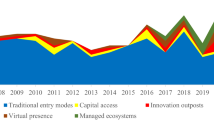Abstract
This paper contributes to the development of the field of international corporate entrepreneurship (ICE) by examining the influences that the time lapse between foundation and first international market entry may have on the development of an entrepreneurial orientation (EO). Moreover, the paper highlights the existence of a positive relationship between the development of an entrepreneurial orientation and both internationalization decision and dimensions (degree, scope) in established companies. Based on a sample of 155 Spanish firms, our findings suggest that an entrepreneurial orientation positively influences a firm’s propensity to internationalize activities. The results obtained confirm the idea that fast entry into foreign markets is positively related to the development of an entrepreneurial orientation in established firms, and that firms with a marked entrepreneurial orientation have higher relative international sales and operate in a greater number of foreign countries.

Similar content being viewed by others

Notes
In other words, economic, political, social, and legal shifts.
This database contains references to 850,000 Spanish firms.
We first ran an ANOVA analysis, but the Levene test showed that data does not accomplish the assumption of homogeneity of variances.
We conducted an ordinal regression analysis because the dependent variable is ordinal; that is, its values present an ascendant order.
We conducted an ordinal regression analysis because the dependent variable is ordinal; that is, its values present an ascendant order.
References
Ahuja G, Lampert C (2001) Entrepreneurship in the large corporation: a longitudinal study of how established firms create breakthrough inventions. Strateg Manage J 22:521–543
Alvarez SA, Busenitz L (2001) The entrepreneurship of resource-based theory. J Manage 27(6):755–775
Autio E (2005) Creative tension: the significance of Ben Oviatt’s and Patricia Mcdougall’s article: toward a theory of international new ventures. J Int Bus Stud 36:9–19
Autio E, Sapienza HJ, Almeida JG (2000) Effects of age at entry, knowledge intensity and imitability on international growth. Acad Manage J 43(5):909–924
Barbosa N, Louri H (2002) On the determinants of multinationals’ ownership preferences: evidence from Greece and Portugal. Int J Ind Organ 20(4):493–515
Barringer BR, Bluedorn AC (1999) The relationship between corporate entrepreneurship and strategic management. Strateg Manage J 20(5):421–444
Becherer RC, Maurer JG (1997) The moderating effect of environmental variables on the entrepreneurial an marketing orientation of entrepreneur-led firms. Entrep Theory Pract 22(1):47–59
Bell J, McNaughton R, Young S (2001) “Born-Again Global” firms an extension to the “Born Global” phenomenon. J Int Manage 7(3):173–189
Bentler PM, Bonett DG (1980) Significance tests and goodness-of-fit in the analysis of covariance structures. Psychol Bull 88:588–606
Caves RE, Mehra S (1986) Entry of foreign multinationals into U.S. manufacturing industries. In: Porter M (eds) Competition in global industries. Harvard Business School Press, Boston, pp 449–481
Coviello NE, Jones MV (2004) Methodological issues in international entrepreneurship research. J Bus Venturing 19(4):485–508
Covin JG, Miles MP (1999) Corporate entrepreneurship and the pursuit of competitive advantage. Entrep Theory Pract 23(3):47–63
Covin JG, Slevin DP (1989) Strategic management of small firms in hostile and benign environments. Strateg Manage J 10:75–87
Covin JG, Slevin DP (1991) A conceptual model of entrepreneurship as firm behavior. Entrep Theory Pract 16(1):7–25
Covin JG, Green KM, Slevin DP (2006) Strategic process effects on the entrepreneurial orientation–sales growth rate relationship. Entrep Theory Pract 30:57–81
Crick D, Jones M (2000) Small high-technology firms and international high-technology markets. J Int Mark 8(2):63–85
Crick D, Spence M (2005) The internationalization of ‘high performing’ UK high-tech Smes: a study of planned and unplanned strategies. Int Bus Rev 14(2):167–185
Cuervo-Cazurra A (2003) The non-sequential internationalization process, Jornadas sobre internacionalización de la empresa, Madrid
Dana LP, Wright LP (2004) Emerging paradigms of international entrepreneurship. In: Dana LP (eds) Handbook of research on international entrepreneurship. Edward Elgar, Aldershot
Davidsson P (2004) Researching entrepreneurship. Springer, Berlin Heidelberg New York
Dess GG, Ireland RD, Zahra SA, Floyd SW, Janney JJ, Lane PJ (2003) Emerging issues in corporate entrepreneurship. J Manage 29(3):351–378
Dickson PH, Weaver KM (1997) Environmental determinants and individual-level moderators of alliance use. Acad Manage J 20(2):404–425
Dimitratos P, Jones M (2005) Future directions for international entrepreneurship research. Int Bus Rev 14:119–128
Dun & Bradstreet (2002) Database, containing references about 850,000 Spanish firms
Eckhardt J, Shane S (2003) Opportunities and entrepreneurship. J Manage 29(3):333–350
Eriksson K, Chetty S (2003) The effect of experience and absorptive capacity on foreign market knowledge. Int Bus Rev 12(6):673–695
Erramilli MK (1991) The experience factor in foreign market entry behaviour of service firms. J Int Bus Stud 22(3):479–501
Erramilli MK, Rao CP (1993) Service firms’ international entry mode choice: a modified transaction-cost analysis approach. J Mark 57(3):19–38
Fladmoe-Lindquist K, Tallman S (1994) Resource-based strategy and competitive advantage among multinationals. Adv Strateg Manage 10:45–72
Fletcher D (2004) International entrepreneurship and the small business. Entrep Reg Dev 16:289–305
Fornell C, Larcker DF (1981) Evaluating structural equations models with unobservable variables and measurement error. J Mark Res 18:39–50
Gallo MA, Garcia-Pont C (1996) Important factors in family business internationalisation. Fam Bus Rev 9(1):45–59
Gomes-Casseres B (1989) Ownership structures of foreign subsidiaries: theory and evidence. J Econ Behav Organ 11:1–25 (January)
Grant RM (1996) Prospering in dynamically-competitive environments: organizational capability as knowledge integration. Organ Sci 7(4):375–388
Hennart JF, Park YR (1993) Greenfield vs. Acquisition: the strategy of Japanese investors in the United States. Manage Sci 39(9):1054–1070
Hitt MA, Ireland RD, Camp SM, Sexton DL (2002) Strategic entrepreneurship. Creating a new mindset. Blackwell, Oxford
Junkkari J (2000) Born global-globalization strategies of SME high-quality service companies. Master’s thesis, Helsinki school of economics and business studies, Helsinki
Kim WC, Hwang P (1992) Global strategy and multinationals’ entry mode choice. J Int Bus Stud 23(1):29–53
Kirzner I (1997) Entrepreneurial discovery and the competitive market process: an Austrian approach. J Econ Lit 35:60–85
Knight GA, Cavusgill T (2004) Innovation, organizational capabilities, and the born-global firm. J Int Bus Stud 35:124–141
Kogut B, Singh H (1988) The effect of national culture on the choice of entry mode. J Int Bus Stud 19(3):411–432 (Fall)
Kogut B (1989) A note on global strategy. Strateg Manage J 10:383–389
Kogut B, Chang SJ (1991) Technological capabilities and Japanese foreign direct investment in the United States. Rev Econ Stat 73(3):401–413
Kreiser PM, Marino LD, Weaver KM (2002) Assessing the psychometric properties of the entrepreneurial orientation scale: a multi-country analysis. Entrep Theory Pract 26:71–94
Lu JW, Beamish PW (2001) The internationalization and performance of SMES. Strateg Manage J 22:565–586
Lumpkin GT, Dess GG (1996) Clarifying the entrepreneurial orientation construct and linking it to performance. Acad Manage Rev 21(1):135–172
Lumpkin GT, Dess GG (2001) Linking two dimensions of entrepreneurial orientation to firm performance. The moderating role of environment and industry life cycle. J Bus Venturing 16(5):429–451
Luostarinen R, Gabrielson M (2002) Globalisation and global marketing. Strategies of born globals in SMOPECs. http://www.aueb.gr/deos/EIBA2002.files/PAPERS/C33.pdf
McDougall PP, Oviatt BM (2000) International entrepreneurship: the intersection of two research paths. Acad Manage J 43(5):902–906
McEvily B, Zaheer A (1999) Bridging ties: a source of firm heterogeneity in competitive capabilities. Strateg Manage J 20(12):1133–1156
Miller D (1983) The correlates of entrepreneurship in three types of firms. Manage Sci 29(7):770–791
Miller KD (1992) A framework for integrated risk management in international business. J Int Bus Stud 23(3):11–331
Morris MH, Sexton DL (1996) The concept of entrepreneurial intensity: implications for company performance. J Bus Res 36:5–13
Okoroafo SC (1999) Internationalization of family business: evidence from Northwest Ohio. Fam Bus Rev 12(2):45–58
Oviatt BM, McDougall PP (1994) Toward a theory of international new ventures. J Int Bus Stud 25:45–64
Oviatt BM, McDougall PP (2005) Defining international entrepreneurship and modeling the speed of internationalization. Entrep Theory Pract 29(5):537–553
Papadopoulos S (1987) Strategic marketing techniques in international tourism. Int Mark Rev 4(2):71–85
Preece S, Miles G, Baetz MC (1998) Explaining the international intensity and global diversity of early-stage technology-based firms. J Bus Venturing 14(3):259–281
Rialp-Criado A, Rialp-Criado J, Knight G (2002) The phenomenon of international new ventures, global start-ups, and born-globals: what do we know alter a decade (1993–2003) of exhaustive inquiry? Documentos de trabajo del Dep. D’Economia de l’Empresa Universitat Autonoma de Barcelona
Ripollés M, Menguzzato M, Iborra M (1999) Empresas internacionales de reciente creación e intensidad empresarial. Rev Eur Dir Econ Empresa 8(3):127–138
Shook C, Priem RL, McGee JE (2003) Venture creation and the enterprising individual: a review and synthesis. J Manage 40:1122–1149
Shrader R, Oviatt BM, McDougall PP (2000) How new ventures exploit tradeoffs among international risk factors: lessons for the accelerated internationalization of the 21st century. Acad Manage J 43(6):1227–1247
Spence M, Crick D (2006) A comparative investigation into the internationalisation of Canadian and UK high-tech Smes. Int Mark Rev 23(4):390–417
Stevenson HH, Gumpert DG (1985) The heart of entrepreneurship. Harvard Bus Rev 85(2):85–95
Stevenson HH, Jarillo JC (1990) A paradigm of entrepreneurship: entrepreneurial management. Strateg Manage J 11:17–27
Stokes D (2000) Putting entrepreneurship into marketing: the processes of entrepreneurial marketing. J Res Mark Entrep 2(1):1–16
Sullivan D (1994) Measuring the degree of internationalization of a firm. J Int Bus Stud 25:325–342
Sullivan D (1996) Measuring the degree of internationalization of a firm: a reply. J Int Bus Stud 27:167–178
Tan B, Erramilli K, Liang TW (2001) The influence of dissemination risks, strategic control and global management skills on firms’ modal decision in host countries. Int Bus Rev 10(3):323–340
Taylor CR, Zou S, Osland GE (2000) Foreign market entry strategies of Japanese MNCs. Int Mark Rev 17(2):146–163
Wiklund J, Shepherd D (2003) Knowledge-base resources, entrepreneurial orientation, and the performance of small and medium-sized business. Strateg Manage J 24:1307–1314
Wiklund J, Shepherd D (2005) Entrepreneurial orientation and small business performance: a configurational approach. J Bus Venturing 20:71–91
Woo CY, Cooper AC, Dunkelberg WC (1991) The development and interpretation of entrepreneurial typologies. J Bus Venturing 6:93–114
Yip GS (1982a) Barriers to entry. A corporate-strategy perspective. Lexington, Lexington
Yip GS (1982b) Diversification entry: internal development versus acquisition. Strateg Manage J 3(4):331–345
Zahra SA (2005) A theory of international new ventures: a decade of research. J Int Bus Stud 36:20–28
Zahra SA, George G (2002) International entrepreneurship: the current status of the field and future research agenda. In: Hitt MA, Ireland RD, Camp SM, Sexton DL (eds) Strategic entrepreneurship: creating a new mindset. Blackwell, Oxford, pp 255–288
Zahra SA, Jennings DF, Kuratko DF (1999) The antecedents and consequences of firm-level entrepreneurship: the state of the field. Entrep Theory Pract 24(2):45–66
Author information
Authors and Affiliations
Corresponding author
Additional information
The authors wish to acknowledge the funding received from the Spanish Ministry of Science and Technology through the SEC2002-01878 project. This paper is also part of the “Analysis of Factors that Influence on Competitiveness and Business Performance of Global New Ventures” (GV/2007/102) research project, financially supported by the Valencian Government’s Ministry of Business, Universities and Science.
Rights and permissions
About this article
Cite this article
Ripollés-Meliá, M., Menguzzato-Boulard, M. & Sánchez-Peinado, L. Entrepreneurial orientation and international commitment. J Int Entrepr 5, 65–83 (2007). https://doi.org/10.1007/s10843-007-0016-0
Received:
Accepted:
Published:
Issue Date:
DOI: https://doi.org/10.1007/s10843-007-0016-0



